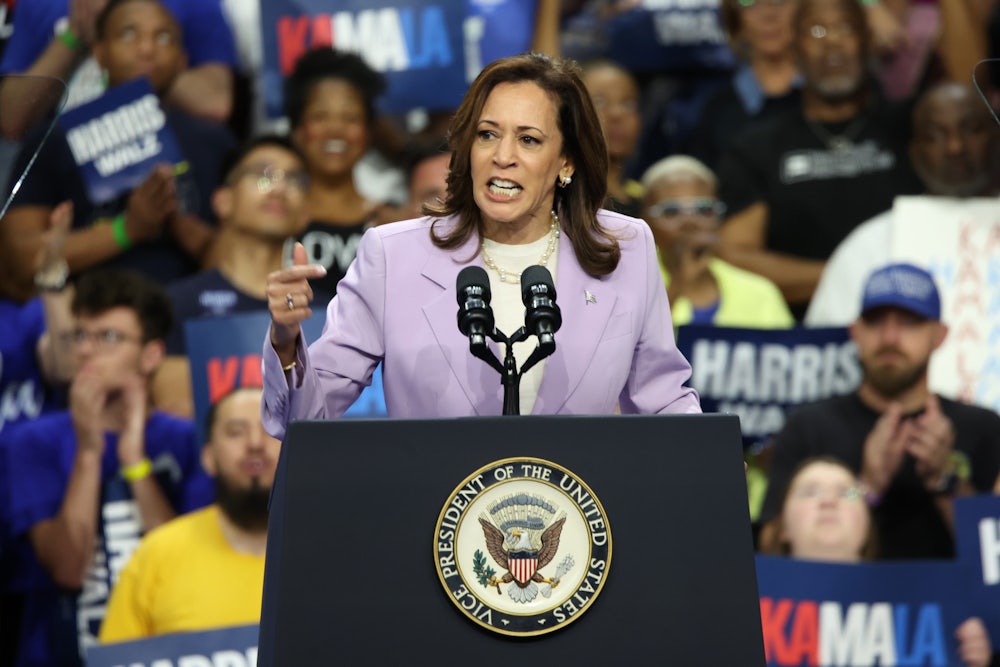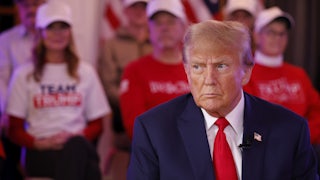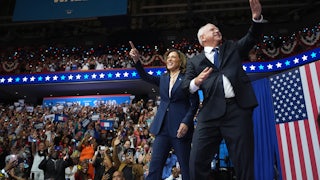Has Donald Trump offered to cut your taxes yet? If he hasn’t, count yourself insulted. In April Trump promised favorable tax and regulatory treatment to the oil and gas industry, provided it would contribute $1 billion to his campaign. Trump actually called this a “deal,” tempting a Teapot Dome–style bribery prosecution. Rather naïvely, I thought Trump’s blatancy would scare off potential contributors. Instead, over the next three months Trump nearly doubled his haul from this industry sector.
Trump followed up this stunt by telling a rally in Palm Beach, tent-revival style, that anybody who cut the Republican Party a $1 million check could come onstage and speak (whereupon two donors ascended the stage, one declaring “Donald J. Trump is the person that God has chosen”); by telling a group of corporate donors gathered at the Pierre Hotel that his price for a lunch meeting was $25 million; and by informing this same group that if they wanted to keep their 2017 cut in corporate and individual rates, then they’d better give “whatever you guys can do.” Without a quid pro quo, Trump later told a group of chief executives in Washington that he would cut the corporate tax rate to 20 percent, down from the current 21 percent. (Before Trump’s 2017 tax bill, the top corporate tax rate was 35 percent.)
More recently, Trump has auctioned off policy positions not for cash contributions but—in the more traditional style—for votes. Fresh off his conviction on 34 felony counts, Trump told a Las Vegas rally on June 9: “For those hotel workers and people that get tips, you’re going to be very happy, because when I get to office, we are going to not charge taxes on tips.” As I explained at the time, exempting tips from taxes is a bad idea because to the limited extent tipped workers pay any income tax at all, exempting tips from federal taxes would incentivize employers to pay lower wages. Far better to eliminate the “tipped” subminimum wage of $2.25 per hour and to raise the regular hourly minimum, which for 15 years has been stuck at a miserly $7.25, to $15. Under this scheme, the worker gets his or her raise not from the Internal Revenue Service but from the boss. On June 9, Nevada’s powerful Culinary Union Local 226 called Trump’s tax holiday for tips a “wild campaign promise” that Nevada voters were too smart to fall for.
But Trump’s “wild campaign promise” proved popular. A Newsweek/Redfield & Wilton Strategies poll released August 4 showed that 67 percent of eligible voters favored eliminating taxes on tips, including 65 percent of Democrats. Nevada voters in particular are less likely to prefer the good-government solution of altering subminimum and minimum wages, for two reasons. The first is that Nevada (along with the non-battleground states of Alaska, California, Minnesota, Montana, Oregon, and Washington) already outlawed the tipped subminimum wage. The second reason is that Nevada’s hourly minimum of $12, though far from the highest in the country, is still higher than in most other states.
As a consequence, Culinary Local 226—a mere six weeks after it denounced Trump’s harebrained tax idea—endorsed it, directing Nevada lawmakers at all levels “to ensure that there are no taxes on tips.” And when Kamala Harris came to Nevada this past weekend to collect Culinary Local 226’s endorsement, she fell in line. At a Saturday rally, Harris said:
When I am president, we will continue our fight for working families of America, including to raise the minimum wage and eliminate taxes on tips for service and hospitality workers.
Both of these policies won approving cheers from the crowd, but the cheer for eliminating taxes on tips was louder. The American Prospect’s David Dayen, who was present at the rally, reported that a Harris campaign aide assured him there would be income limits and other “strict requirements” to prevent real estate and tax brokers, lawyers, and other wealthy individuals from benefiting by gaming the system. But it’s still a bad idea. The best you can say for it is that it isn’t as bad as Trump’s latest pander, which is to eliminate taxes on Social Security.
“SENIORS SHOULD NOT PAY TAXES ON SOCIAL SECURITY!” Trump declaimed on July 31 on Truth Social. This is a regressive proposal that would further destabilize the Social Security and Medicare trust funds, which is where this portion of income tax goes. The trust funds are projected to collect $1.6 trillion from these sources over the next decade. According to the nonprofit Tax Foundation, eliminating taxes on Social Security benefits would move up the date when Social Security is projected to go bust from 2035 to 2033, and when Medicare is projected to go bust from 2036 to 2030.
Who decided in the first place that tips and Social Security benefits were fair game for the IRS? It may sound like a legacy of tax-and-spend liberals, but in fact it’s a legacy of the Reagan administration. Taxes on tips and Social Security payments are, in fact, two of the Gipper’s better accomplishments.
Tips went largely untaxed until September 1982, when President Ronald Reagan signed into law a tax increase intended to undo some of the fiscal damage wrought by his 1981 tax cut. (The 1981 tax cut was the largest in U.S. history, corrected for inflation; the 1982 tax increase was, in turn, the largest tax increase in U.S. history, after inflation.) Prior to the 1982 law, tips were either not subject to taxation at all or subject to taxation on a sort of honor system. The result was that an estimated 84 percent of tips were unreported to the IRS. The 1982 tax hike added new paperwork requirements that made it harder for workers to evade paying taxes on their tips. More recently, consumers’ growing tendency to put their tips on credit cards has made evasion harder still.
Social Security benefits went entirely untaxed from 1940, when the first retirement check was cut, until 1984. Interestingly, the rationale for not taxing these benefits was that the IRS considered them to be a kind of gratuity—more in the sense of a gift than in the sense of a tip. But in 1983, with the Social Security trust fund’s finances in imminent peril, a commission headed by Alan Greenspan concluded that senior citizens, then as now wealthier than the general population, ought to pay taxes on their Social Security benefits. Senators Bob Dole, a Republican, and Daniel Patrick Moynihan, a Democrat, who were both members of the commission, collaborated on a bipartisan bill to achieve this, in defiance of fierce opposition (mainly from Democrats, who’d used Social Security as a battering ram against Republicans in the 1982 midterms). Reagan signed the bill into law in April 1983.
Today the tax on Social Security benefits is fairly progressive—and much more so than the flat 6.2 percent payroll tax that funds the program, which doesn’t apply to income above $169,000. Single filers earning less than $25,000 pay no tax on Social Security benefits at all. Single filers earning between $25,000 and $34,000 pay taxes on 50 percent of their benefits. Above the $34,000 threshold, they pay taxes on 85 percent of their benefits, according to whatever tax bracket they inhabit. Nobody—not even a billionaire—pays tax on 100 percent of their Social Security benefits, which is a little bit nuts.
It would be simpler and more equitable for Social Security benefits to be taxed in full, just like any other income. So if anything, the taxation of Social Security benefits is too low, not too high. Probably Harris can’t get away with saying that. But she can counter Trump on Social Security by asking why on earth America’s highest earners (like, for example, Donald Trump) get to escape paying Social Security payroll taxes on most of their income.
Trump proposed his tax holiday on Social Security because he wants to win back senior citizens. Republicans have won a majority of the senior vote every presidential election since 2000. Trump won 52 percent of voters age 65 and older in 2016 and 2020. But before Biden pulled out, he was beating Trump with older voters, apparently because Trump’s antidemocratic rantings spooked them. With Biden now out of the race, the elderly vote may be in play. Still, if Trump’s problem with older voters is that he’s unstable, he hasn’t done anything to assuage those fears.
The good news is that, for the first time, we have a poll showing voters demonstrate a preference for Harris over Trump on the economy. The poll, published over the weekend by the Financial Times, shows that voters still fault Biden’s management of the economy—only 38 percent approve, against 58 percent who disapprove—which remains as wildly unfair as it ever was. But 42 percent trusted Harris most on the economy, against 41 percent who trust Trump most.
Weirdly, 60 percent of those polled said Harris should either break completely from Biden’s economic program or “make major changes” to it, even though Harris has yet to distinguish her economic program from Biden’s in any way. Conceivably Harris can reintroduce Biden policies such as higher taxes on the rich and more spending on green technology and find that people like them better when they hear about them from a 59-year-old woman than from an 81-year-old man. What Harris should not do is pledge to exempt Social Security benefits from taxation. Bringing one Trump tax policy on board is already too many.








